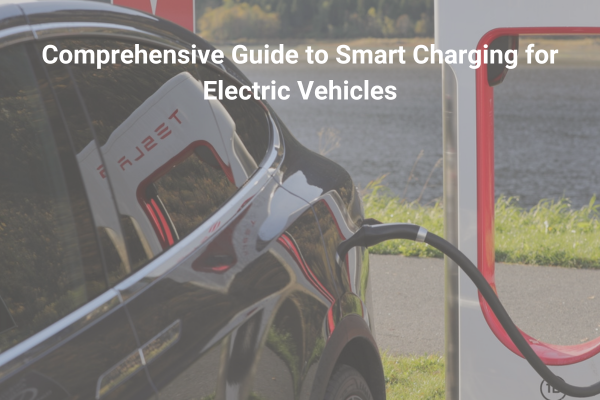Comprehensive Guide to Smart Charging for Electric Vehicles


In this blog, we will delve into the future of BMS technology and explore the innovative trends that are shaping electric vehicle batteries.
Here are the key reasons why BMS is essential in electric vehicle batteries:
Optimal Battery Performance: BMS monitors and controls various parameters of the battery, including state of charge, voltage, temperature, and current. It ensures that the battery operates within safe limits and maximizes its performance. By regulating the charging and discharging processes, BMS helps maintain a balanced state of charge, preventing overcharging and deep discharging, which can degrade the battery.
Battery Health and Longevity: BMS incorporates advanced algorithms and monitoring techniques to assess the health of the battery. It tracks the battery's state of health (SOH) and provides insights into its capacity and degradation over time. By managing the charge and discharge cycles, BMS helps extend the lifespan of the battery, optimizing its efficiency and reducing the need for premature replacements.
Safety and Protection: BMS ensures the safe operation of the battery by monitoring critical parameters such as cell voltage, temperature, and current. It safeguards against overcharging, over-discharging, and excessive temperatures that can lead to battery damage or safety hazards. BMS also provides fault detection and early warning systems, alerting the driver or initiating protective measures in case of abnormalities or potential failures.
Energy Efficiency and Range Optimization: BMS plays a crucial role in maximizing the energy efficiency of an EV. By monitoring and optimizing the energy flow within the battery, BMS minimizes energy losses and ensures that the available energy is used efficiently. It helps maintain a stable and balanced state of charge, which directly impacts the driving range of the vehicle.
Intelligent Charging and Discharging: BMS incorporates intelligent charging algorithms that consider factors such as charging rate, battery temperature, and energy demand. It optimizes the charging process to minimize charging time while avoiding stress on the battery. Similarly, during discharging, BMS ensures that power is delivered smoothly and efficiently to the vehicle's systems, maintaining performance and range.
Data Monitoring and Diagnostics: BMS collects and analyzes real-time data from the battery, providing valuable insights into its performance and health. This data helps identify potential issues or abnormalities, enabling proactive maintenance and timely interventions. BMS also facilitates remote diagnostics, allowing manufacturers to assess the battery's condition and provide remote support if needed.
Several future trends and predictions can be identified that will shape the development and implementation of BMS in electric vehicle batteries:
Improved Energy Density: One of the key areas of focus in battery technology is increasing energy density, which refers to the amount of energy stored per unit volume or weight. Future BMS systems will be designed to manage and optimize the performance of high-energy-density batteries, allowing for longer driving ranges and improved overall efficiency.
Enhanced Safety Features: Safety remains a top priority in EVs, and BMS will continue to play a crucial role in ensuring safe battery operation. Future BMS systems are expected to incorporate even more advanced safety features, such as enhanced fault detection capabilities, improved thermal management, and advanced cell balancing mechanisms to mitigate safety risks and protect against potential battery failures.
Artificial Intelligence (AI) Integration: The integration of artificial intelligence and machine learning algorithms into BMS will enable more advanced battery diagnostics and predictive capabilities. AI-powered BMS systems can analyze large amounts of data in real time, identifying patterns, predicting battery health, and optimizing battery performance based on driving conditions and user behavior.
Bidirectional Charging and Vehicle-to-Grid (V2G) Integration: As EV adoption increases, the concept of bidirectional charging and vehicle-to-grid integration is gaining traction. BMS will play a vital role in managing bidirectional energy flow, allowing EVs to not only charge from the grid but also supply power back to the grid during peak demand periods. This will require BMS to efficiently manage the charging and discharging cycles, as well as optimize the power flow based on user preferences and grid requirements.
Wireless Charging Compatibility: Wireless charging technology is evolving rapidly, and future BMS systems will need to adapt to this new charging paradigm. BMS will be responsible for managing wireless charging protocols, ensuring efficient power transfer, and monitoring the charging process wirelessly. This will provide users with more convenience and flexibility in charging their electric vehicles.
Cloud-Based Connectivity and Remote Updates: BMS systems will leverage cloud-based connectivity to enable remote monitoring, diagnostics, and updates. Manufacturers will be able to collect data from vehicles in real-time, analyze battery performance, and provide over-the-air updates to improve BMS functionality and address any emerging issues. This connectivity will also facilitate vehicle-to-manufacturer communication, allowing for remote assistance and optimized maintenance schedules.
Sustainable and Recyclable Battery Solutions: The focus on sustainability will drive the development of BMS solutions that facilitate the use of sustainable materials and support recycling efforts. BMS systems will incorporate features that optimize battery life, reduce degradation, and enable efficient recycling of battery components at the end of their life cycle.
In conclusion, the future of Battery Management Systems (BMS) is set to revolutionize electric vehicle batteries and propel the adoption of electric vehicles to new heights. The advancements and trends discussed above highlight the importance of BMS in optimizing battery performance, enhancing safety, and enabling innovative features in EVs.
Take the next step towards driving the future of electric mobility by choosing our brand and experiencing the unmatched performance and reliability of our electric vehicles. Visit our website or contact our authorized dealers to explore our range of electric vehicles and find the perfect fit for your needs.